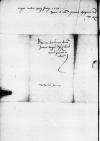Ago et habeo Reverendissimae Dominationi Vestrae gratias, quod me nihil iam dudum scribentem litteris suis visere et manu sua scribere non est dedignata. Eam gratiam Reverendissimae Dominationis Vestrae, quam ego magnifacio plurimum, enitar perpetuo obsequendi studio Reverendissimae Dominationi Vestrae mereri. Hic autem nihil est, quod Reverendissimae Dominationi Vestrae scribam, nisi quia sacra ⌊regia maiestas⌋ cum sua regia domo ex gratia Dei recta fruitur valetudine.
Exercitus ⌊maiestatis suae regiae⌋ militum mercenariorum, equitum et peditum sub ductu magnifici domini ⌊Ioannis comitis de Tharnow⌋ palatini ⌊Russiae⌋ generalis iam prope fines ⌊Moscoviae⌋ castra metatur, expectans procerum et totius nobilitatis eo congressum, qui admodum segniter conveniunt et militibus mercenariis maius stipendium augetur, cum primum autem congredientur, in terram hostilem intrabunt et obsequia reipublicae facient. Hostium autem exercitus in finibus est et fines suos tueri intendit. Dominus Deus det nostris victoriam et felices in hostibus illis successus.
De Turco scribitur ex ⌊Italia⌋, quod a ⌊Persis⌋ fusus sit et profligatus ingenti strage adeo, ut cum paucis aufugerit, in quo bello ⌊Ibraimbassa⌋, summus illius consiliarius, desideraretur. Hoc an verum sit nec ne, postea experiemur. Caesarea et catholica maiestas classem ingentem parat vel mittit contra Thurcum, cuius maiestati Dominus tribuat victoriam et felices successus.
Fuit hic etiam non pridem in aula dominus ⌊Felix Mieldzynski⌋, non procul a ⌊Lubava⌋ vicinus Reverendissimae Dominationis Vestrae, qui illustrissimo domino ⌊duci Prussiae⌋ servit et non diu ex ⌊Hispaniis⌋, ubi a domino duce Prussiae missus fuerat, reversus, is in laudem et honorem Dominationis Vestrae Reverendissimae multa hic praedicabat, ut in aula caesarea Reverendissima Dominatio Vestra primum ab ipsa ⌊caesarea maiestate⌋ et summis eius satrapis ac deinde iunioribus in summo honore, amore et gratia habeatur utque eius saepius reminiscantur, quod mihi bono Reverendissimae Dominationis Vestrae servitori admodum iucundum erat audire, sed ille Reverendissimae Paternitati Vestrae solus dicet, quando ad illam veniet, est enim adulescens discretus et disertus, utque vidi et novi, gratiam Dominationis Vestrae Reverendissimae cuperet sibi aucupari.
Si quid novi hic postea natum fuerit, scribam Reverendissimae Dominationi Vestrae, in cuius gratiam me vehementer commendo et ipsam optime ac felicissime valere cupio.

